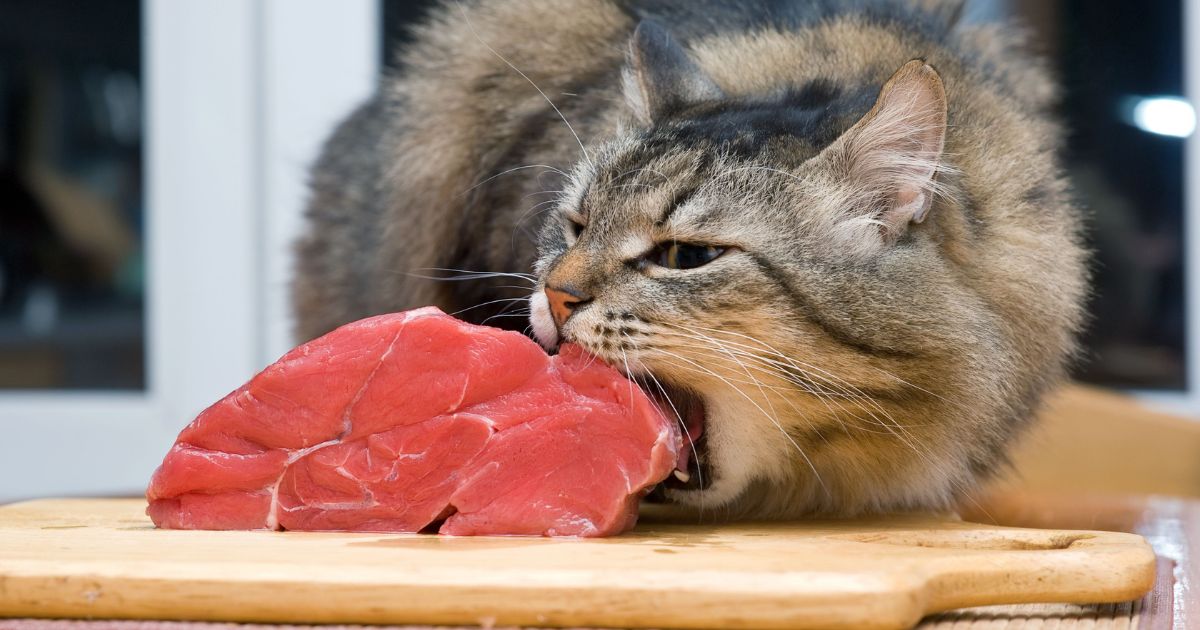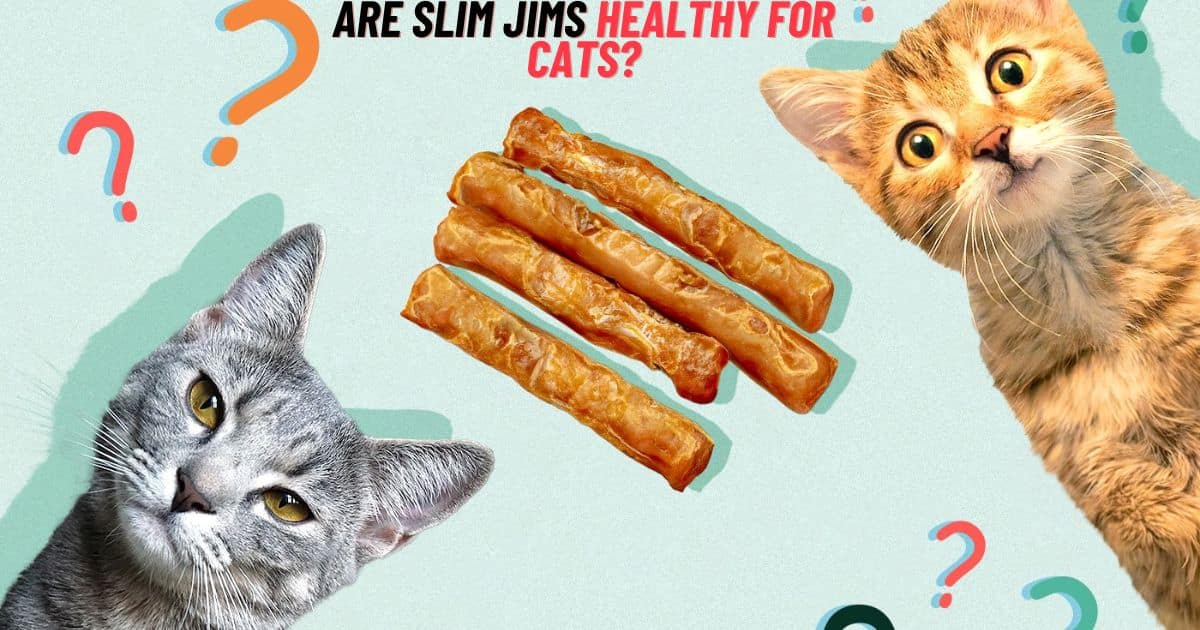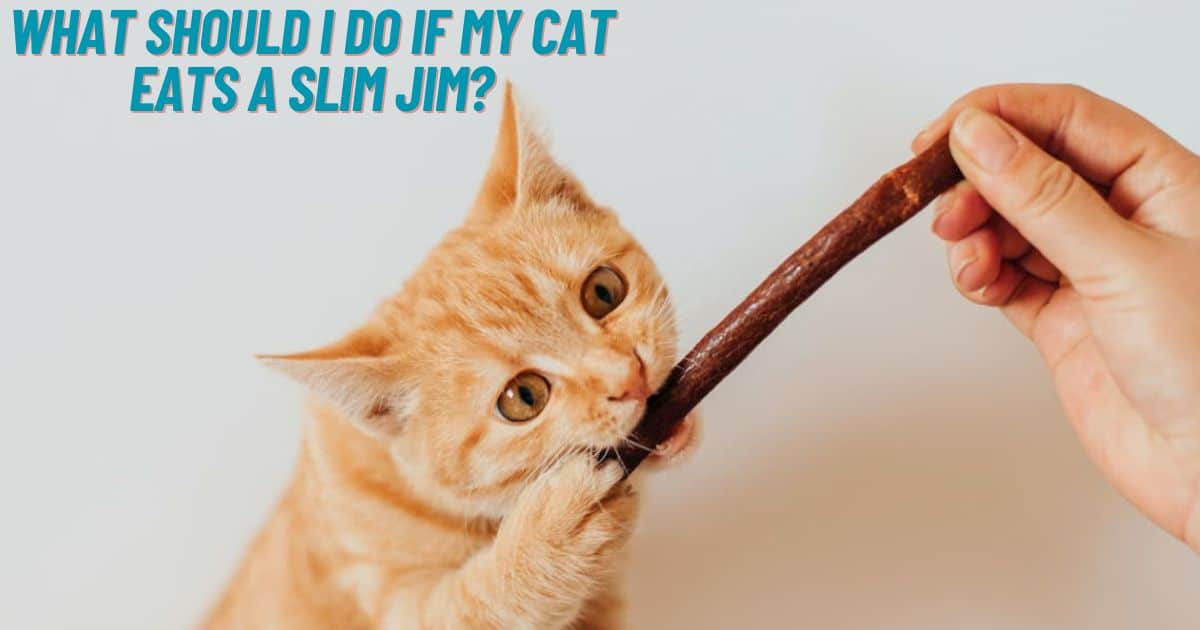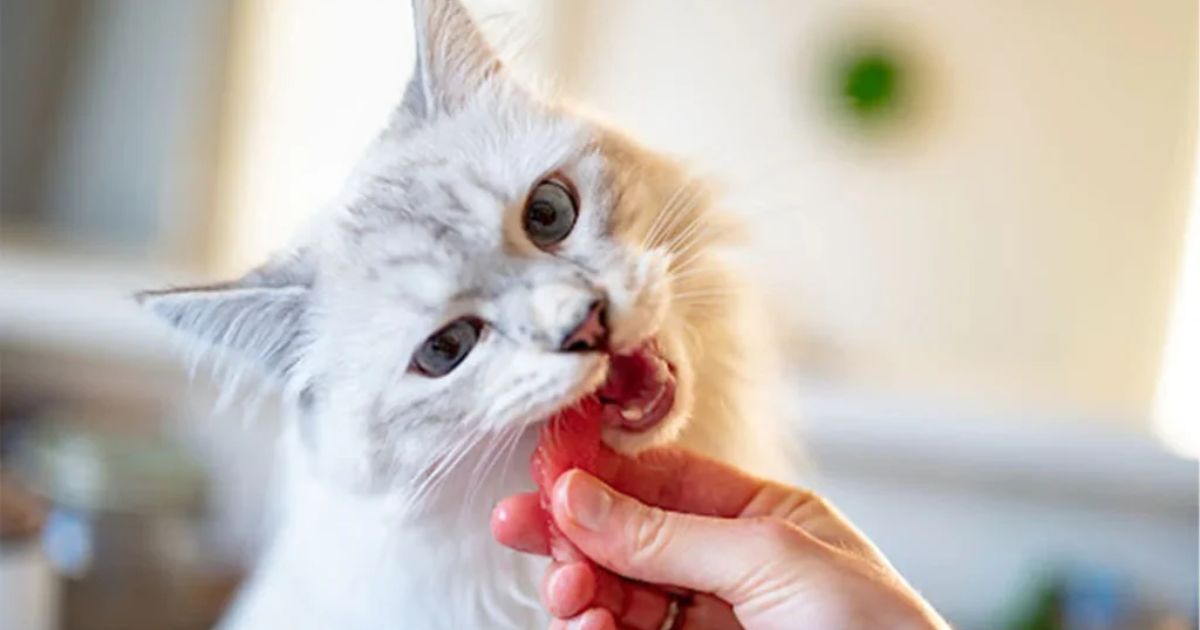Slim Jims are a popular gas station snack made of processed beef and lots of sodium, spices, and preservatives. While they may look tasty, Slim Jims are not good for cats to eat. The high sodium content far exceeds what cats should consume and can strain the kidneys. Too much fat can also cause digestive upset and pancreatitis. The artificial flavors and heavy processing mean Slim Jims have little nutritional value for cats. For their health, cats should avoid beef jerky snacks like Slim Jims which are made for human consumption. Vomiting, diarrhea, and thirst are signs a cat may have eaten too many Slim Jims.
What’s In A Slim Jim?

Slim Jims are a popular brand of meat stick or beef jerky sold in convenience stores around the United States. The snack got its start back in the 1960s and is known for its slender, long shape and smoky, seasoned flavor.
The main ingredient in Slim Jims is beef, followed by various seasonings and preservatives to help keep the meat shelf-stable. A typical Slim Jim contains around 7 grams of protein but also high amounts of sodium, saturated fat, and nitrates. While they make a tasty high-protein snack, Slim Jims should only be eaten in moderation.
Is It Okay To Give My Cat Beef Jerky?
High Salt Content
Beef jerky typically contains a high level of salt and other preservatives, which are not healthy for cats. Excessive salt intake can lead to dehydration, salt poisoning, and kidney issues in cats.
Seasonings and Spices
The spices and seasonings used in beef jerky, like garlic and onion powder, can be toxic to cats. Even in small amounts, these ingredients can cause digestive upset or more serious health issues.
Choking Hazard
The tough and chewy texture of beef jerky might be difficult for cats to chew and swallow, posing a choking hazard or the risk of gastrointestinal blockages.
High Fat Content
Many types of beef jerky are also high in fats, which can be difficult for cats to digest and might lead to obesity and pancreatitis.
If you want to give your cat a meaty treat, it’s better to offer plain, cooked meats that are safe for cats, like chicken or turkey, without added salt, seasonings, or sauces. Always consult with your veterinarian before introducing new foods into your cat’s diet. They can provide the best advice tailored to your cat’s specific health needs.
What Happens If A Cats Eats A Slim Jim?
Gastrointestinal Distress
The high fat and spice content of Slim Jims can irritate a cat’s digestive tract, causing symptoms like vomiting, diarrhea, decreased appetite, and abdominal pain. These effects are generally short-term once the Slim Jim passes through the GI system. Make sure your cat stays hydrated by providing extra water and low-sodium broths.
Can Cats Eat Plain Beef?

Yes, cats can eat plain beef if it’s cooked properly and served in moderation. Beef is a good source of protein, essential amino acids, and certain vitamins and minerals beneficial for cats. However, the beef should be cooked without any added salt, seasonings, or sauces, as these can be harmful to cats. Raw beef should be avoided due to the risk of bacterial contamination like salmonella or E. coli.
Always cut the beef into small, manageable pieces to prevent choking hazards. Introduce beef into your cat’s diet gradually to assess for any allergic reactions or digestive issues. As with any treat, beef should not replace a cat’s regular, balanced diet and should only be a small part of their overall intake. Regular veterinary consultation is recommended to ensure the dietary needs of your cat are being met.
What Snacks Are Safe For Cats To Eat?
When choosing safe, healthy snacks for cats, it’s important to read ingredients lists and avoid anything with added salt, spices, onions, garlic, or artificial flavors. Some nutritious snack options for cats include:
- Small pieces of plain, cooked chicken or fish (no bones or seasoning)
- Freeze-dried raw treats made for cats
- Low-sodium chicken or vegetable broth
- Thinly sliced cooked sweet potatoes or carrots
- Plain yogurt (no sugar added)
- Cat grass or other edible plants like wheatgrass or catnip
- Commercial cat treats (high protein, grain-free)
- Plain cooked egg whites or scrambled eggs
- Unsalted nuts like almonds or walnuts
- Air-popped popcorn (no butter or salt)
Tips for Giving Cats Healthy Snacks:
- Introduce new foods slowly and watch for signs of an upset stomach
- Cats have strong carbohydrate needs, so limit snacks high in carbs
- Provide snacks in moderation to avoid weight gain
- Choose grain-free and low-sugar options
- Avoid snacks made for humans, like chips, cookies, and lunchmeat
When in doubt, read the label and consult your vet about safe, cat-approved snacks.
Are Slim Jims Healthy For Cats?

With their high sodium content and long list of artificial ingredients, Slim Jims don’t provide much nutritional value for cats.
Cats are obligate carnivores, meaning they require a meat-based diet. Slim Jims contain some beef, but the quality is low. They’re highly processed and loaded with extra salt, fat, flavorings and preservatives cats don’t need.
Even small amounts could lead to stomach upset. Over time, the additives and sodium in Slim Jims may put extra strain on a cat’s organs. Simply put, these gas station snacks just aren’t designed with feline health in mind.
Can Cats Eat Slim Jims As A Treat?
Slim Jims are very high in sodium, containing around 800 mg per stick. The recommended upper limit for sodium in cat food is only 100 mg per 100 calories. The American Association of Feline Practitioners recommends cats consume no more than 40 mg of sodium per day.
So just a bite or two of a Slim Jim could surpass a cat’s total daily sodium requirement. The excess salt and fat can cause vomiting, diarrhea and other gastric issues.
What Are Healthier Slim Jim Alternatives for Cats?
Instead of Slim Jims, healthier treat options for cats include:
- Shredded chicken or tuna (no seasoning)
- Freeze-dried raw cat food
- Air-dried cat treats (limited ingredients)
- Small pieces of baked fish or plain meat
- Low-sodium chicken or vegetable broth ice cubes
- Steamed veggies like carrots, green beans or sweet potato
For a long-lasting chew, look for all-natural cat chews made from chicken, salmon or other animal proteins. Treats made for human consumption often contain too much fat, salt and spice for feline tummies.
What Should I Do If My Cat Eats A Slim Jim?

If your cat manages to snag an unattended Slim Jim, don’t panic. But do monitor them closely for the next 24 hours for any symptoms like:
- Vomiting or diarrhea
- Decreased appetite
- Lethargy
- Excessive thirst or urination
Cats can sometimes recover from a salty snack with just extra fluids. Try offering some canned tuna juice, low-sodium broth or diluted bone broth to help dilute the sodium.
Seek prompt veterinary care if symptoms last more than 24 hours or seem severe. In some cases, IV fluids may be given to support kidney function and recovery.
Removing all Slim Jims and human snacks like Cats Eat Slim Jims from kitty’s reach will be important to prevent repeat exposure. While one Slim Jim likely won’t cause long-term issues, these meat snacks should not become a regular part of your cat’s diet.
Can Cats Eat Slim Jims? 5 Reasons Why They Are Bad
Can Cats Eat Slim Jims?
No, cats should not eat Slim Jims. These popular gas station snacks contain a number of ingredients that can be harmful to cats, especially in large amounts. Slim Jims are highly processed, heavily seasoned meat sticks not formulated with feline nutrition in mind.
Do Cats Like Slim Jims?
Some cats may be tempted by the strong aroma and meaty flavor of Slim Jims. But even just a few bites could cause stomach upset, vomiting or diarrhea. Cats like the smell of Slim Jims more than the actual snack. There are many healthier treat alternatives cats find just as delicious.
What Should I Do If My Cat Eats Slim Jim?

If your cat manages to eat some Slim Jim, monitor them closely for vomiting, diarrhea, lethargy or other symptoms. Make sure they stay well hydrated by offering extra liquids. Contact your vet if symptoms don’t improve within 24 hours. Prevent repeat exposure by keeping Slim Jims out of paws’ reach.
Reasons Why Slim Jims Are Bad For Cats
- High sodium content – Excessive sodium can strain the kidneys and cardiovascular system.
- High fat content – Can trigger pancreatitis and GI upset.
- Nitrates and nitrites – These preservatives may cause oxidative damage long-term.
- Artificial flavors – Cats should avoid onion, garlic and other flavor additions.
- Heavily processed – Low-quality beef and too many additives.
Can Cats Eat Beef Jerky?
Some beef jerkies may be safe for cats in strict moderation. Look for options free of spices, sugars, preservatives and made from whole cuts of meat. Choose low-sodium jerky and limit to just a treat-sized serving. But for optimal nutrition and safety, quality cat treats are still a better choice.
What Happens If Cats Eat Beef Jerkies?
Eating more than a small taste could irritate the digestive tract, cause vomiting/diarrhea, elevate sodium levels, lead to dehydration, or trigger pancreatitis in some cats. While not acutely toxic, beef jerky should be avoided as a regular snack or meal supplement for cats.
FAQ’s
Are Slim Jims safe for cats to eat?
No, Slim Jims are not safe for cats to eat. They contain too much fat, salt, and spices which can cause gastrointestinal upset.
What ingredients in Slim Jims are harmful to cats?
The high amounts of fat, sodium, spices like garlic and onion powder can be toxic to cats. Cats cannot handle processed, salty, spicy human foods.
What happens if a cat eats a Slim Jim?
Eating even a small amount of a Slim Jim can cause vomiting, diarrhea, dehydration and abdominal pain in cats. The spices and fat can cause pancreatitis.
Can cats have a little piece of Slim Jim as a treat?
No, cats should never be given any amount of Slim Jim. The fatty, salty, and spicy content make it very unsafe. Even a small amount can cause gastrointestinal distress.
Are other cured meats safe for cats to eat?
No, cats should avoid all fatty, heavily seasoned, and salty cured meats like bacon, pepperoni, jerky, salami, and lunch meats. The high fat and salt content can cause pancreatitis.
Final Thoughts
In conclusion, Slim Jims are a convenient snack for people on the go, but they should be avoided as a treat for cats. The highly processed beef contains too much fat, sodium, and artificial ingredients to provide any real nutritional value. While an occasional lick or nibble of a Slim Jim won’t necessarily harm a cat, regular consumption can lead to vomiting, diarrhea, dehydration, and kidney strain. For a healthier, cat-safe alternative, look for lightly seasoned meat or treats specifically formulated for feline diets. When it comes to gas station snacks, leave the Slim Jims for the humans and opt for a more wholesome reward for your feline friend. Moderation and caution are key when introducing any human foods into your cat’s diet. Learn more Dogs Eat Information “Can Dogs Eat Slim Jims? “









